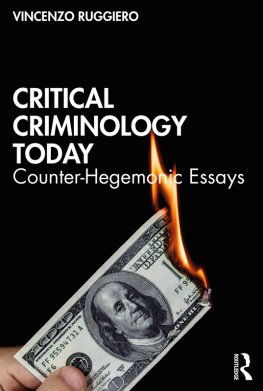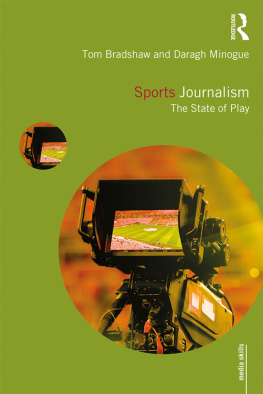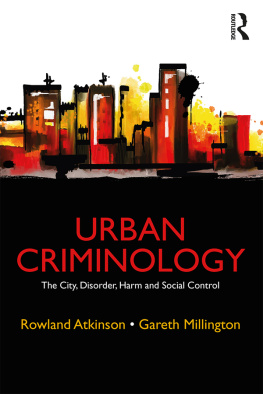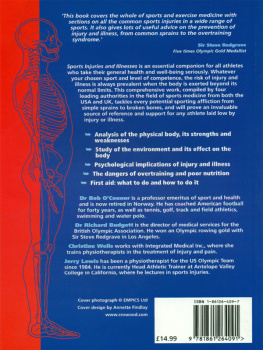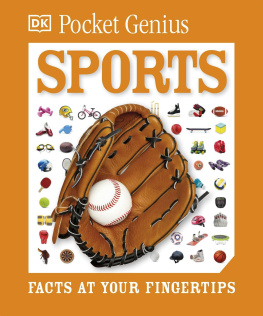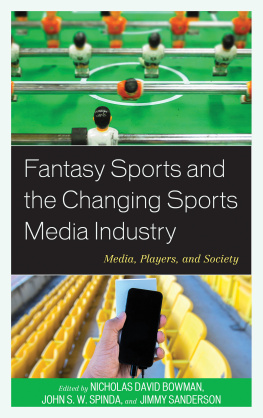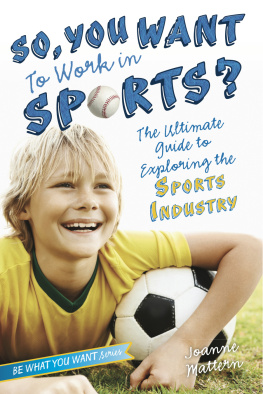NEW HORIZONS IN CRIMINOLOGY
SPORTS CRIMINOLOGY
A critical criminology of sport and games
Nic Groombridge
First published in Great Britain in 2016 by
Policy Press University of Bristol 1-9 Old Park Hill Bristol BS2 8BB UK Tel +44 (0)117 954 5940 e-mail pp-info@bristol.ac.uk www.policypress.co.uk
North American office: Policy Press c/o The University of Chicago Press 1427 East 60th Street Chicago, IL 60637, USA t: +1 773 702 7700 f: +1 773-702-9756 e:sales@press. uchicago.edu www.press.uchicago.edu
Policy Press 2016
British Library Cataloguing in Publication Data
A catalogue record for this book is available from the British Library
Library of Congress Cataloging-in-Publication Data
A catalog record for this book has been requested
ISBN 978-1-4473-2315-0 hardcover
ISBN 978-1-4473-2319-8 ePub
ISBN 978-1-4473-2320-4 Kindle
The right of Nic Groombridge to be identified as author of this work has been asserted by him in accordance with the Copyright, Designs and Patents Act 1988.
All rights reserved: no part of this publication may be reproduced, stored in a retrieval system, or transmitted in any form or by any means, electronic, mechanical, photocopying, recording, or otherwise without the prior permission of Policy Press.
The statements and opinions contained within this publication are solely those of the author and not of the University of Bristol or Policy Press. The University of Bristol and Policy Press disclaim responsibility for any injury to persons or property resulting from any material published in this publication.
Policy Press works to counter discrimination on grounds of gender, race,
disability, age and sexuality.
Cover design by Policy Press
Front cover image: istock
Readers Guide
This book has been optimised for PDA.
Tables may have been presented to accommodate this devices limitations.
Image presentation is limited by this devices limitations.
Contents
Thanks to Andrew Millie the series editor for inviting me to write this book, thereby making me deliver on something Id been talking about for ages with anyone whod listen. So thanks also to the many criminologists subject to my ramblings at conferences and seminars.
Several anonymous reviewers were most helpful in shaping and refining the project. I may have reviewed and judged many books but this is the first I have written.
Thanks also to my family, Hilary and Rhys, for putting up with all this talk of sport. My father, Brian, knew of the book before his death. He could not understand sport , but all his other sons Ed, Tim and Joe have been keen participants and spectators, although I dont expect them to agree with any of this. Thanks also to my sisters: Ellie, a stronger woman than she knows, and Jennie, a more committed rugby player than I ever was.
Series editor: Professor Andrew Millie, Department of Law and Criminology, Edge Hill University, UK
Preface
The Policy Press New Horizons in Criminology book series provides concise authoritative texts that are international in scope and reflect cutting-edge thought and theoretical developments. These short, accessible texts explain principles and developments clearly before going deeper into the subject, and are written so that the non-specialist academic, student or practitioner can understand them. Written by leading authors in their fields, the series aims to become essential reading for all academics and students (and practitioners) interested in where criminology is heading.
Criminology is a subject that has always been willing to explore new horizons, to consider other disciplinary influences and to embrace new methodologies. By exploring new possibilities, fresh and innovative ways to consider the traditional core of criminology can be found; and the traditional core itself might also be questioned. The criminological imagination (see Young, 2011) continues to expand, and this new book series aims to reveal to a wider audience these cutting-edge developments.
With numerous high-profile cases of bribery, drug-taking, illegal gambling, violence and simple cheating in sport, there is clearly scope for a sports criminology. Sportspeople play by various laws, rules and norms that would be familiar to the criminologist all of which can be bent or broken for personal advantage. Furthermore, systems of policing, surveillance, social control and punishment permeate the sporting world. There are also issues of race, disability, gender and sexuality within sport that would interest the criminologist. Perhaps there is much that sport can learn from criminological scholarship, and similarly, much that criminology can learn from sport.
Having an international reputation for his writing on sport and criminology, Nic Groombridge was the obvious choice of author for this book, and I was delighted when he accepted my invitation. His enthusiasm for the subject is evident in his popular blog at http://sportscriminology.blogspot.co.uk, where he states that he is a fan of criminology and of sport. This is certainly evident in this book, which is the first to be published on sports criminology. Nic draws on his experience as a sports fan and (amateur) sportsperson. He also draws influence from the sociology of sport and sports law, but concludes that a sports criminology can say something new, especially if it comes from a critical perspective. His intention is not to carve out a niche for criminologists who are also sports fans, but for a criminological study of sport to also say something to and about criminology more generally.
This is a very readable book, full to the brim with absorbing examples from a range of countries and sports and also some games. It is clearly of interest to criminologists and other academics, students and practitioners with an interest in sport. But it also comes highly recommended for those who are not necessarily sports fans, but want a new perspective on notions of deviance, crime and social harm.
References
Young, J. (2011) The Criminological Imagination, Cambridge: Polity Press.
Although the book addresses some of the more negative aspects of sport, it seems fitting that its gestation should coincide with two of the worlds major sporting events the 2014 World Cup in Brazil had just finished when I started writing, and the 2016 Olympics, also in Brazil, are due to take place around the time of publication. Like many fans, I have gained great pleasure from watching the World Cup on TV over the years. I enjoyed even more being in London during the 2012 Olympics, where I watched live athletics, hockey, cycling, water polo, basketball, the wheelchair marathon and Paralympic swimming.
My own participation in sport is less spectacular, but it ranges from schoolboy rugby union (continued in later life with less success) and judo to low-level athletics (hammerpole vaultsteeplechase combination my contribution to the Corinthian pursuit of points for my club in Southern League Division 7) and occasional back-of-the-pack triathlons. Nowadays I still manage regular five-kilometre parkruns and the odd 10-kilometre race, but I ran my best marathon (in London, in three hours, one minute and 43 seconds) 30 years ago. I am not taking a standpoint epistemological view and insisting that readers should heed me because I have done, and therefore know, sport, but I occasionally mention my sport activities where relevant. I also draw on relevant experiences from my doctoral fieldwork and work for the Home Office.


